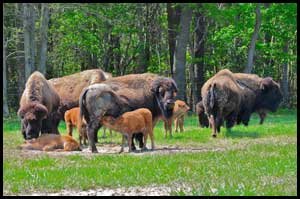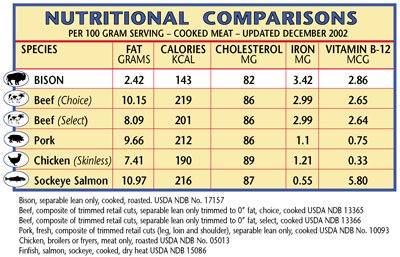THE CASE FOR BISON (AMERICAN BUFFALO) OWNERSHIP

Less than a 100 years ago there were only a 1,000 or so Bison in North America. Thankfully that number now approaches nearly 500,000. Yet prior to settlement of North America by Europeans there number is estimated to have been 60 million or more. Because the Bison of North America have lived here for tens of thousands of years they have naturally adapted to our climate and soil conditions. Unlike cattle they do not require assistance when birthing and can survive in both very cold and very hot climates with much less attention. In fact, it is these vary attributes that makes the case for their ownership. Unlike cattle, hogs, sheep, chickens, etc. one does not need to go to great lengths to feed this untamed animal, pasture grass and water are the essentials.
The National Bison Association (NBA)(http://www.bisoncentral.com) has a wealth of information to help you decide if owning Bison is in your future.
The nutritional advantages of bison meat over beef, pork, chicken and even salmon are very clear as evidenced by the chart below.

Given this chart it is hard to argue that Bison beef is better for you but what about the effects of raising Bison on the Environment in general. Certainly the case can be made that Big Ag style beef production hurts the environment and diverts precious grains away from human consumption. This is not the case with grass fed Bison. Even Nicolette Hahn Niman, a longtime vegetarian and environmental lawyer, I once bought into these claims. Now however now, after more than a decade of living and working in the business she has concluded, that grass fed (her in case cattle) are actually an environmental gain for the planet.
So as with any investment decision you need information on the big 3, The Market, Your Costs, Your Estimated Rate of Return. The following is taken from S& B Bison Ranch (http://www.sbfarmsinc.com).
Bison Market
The market is comprised of three segments:
Meat
Bison meat tastes like the best beef you’ve ever eaten, yet is higher in
protein and lower in fat and cholesterol than beef, chicken, turkey, and
fish. Bison is a natural product, raised without hormones, growth
stimulants, or antibiotics. Demand has exceeded supply for this decade
and is forecasted to continue. In the United States today, ONE day’s beef
consumption exceeds the current ANNUAL Bison meat supply. Bison
bulls and below average females are used in the meat market.
Breeding Stock
Heifer ( females ) calves and cows ( females ) that are
considered average or above, as related to body conformation, are
currently sold for breeding stock. From 2000 to 2010, this market had
been expanding in numbers and price at an annual rate of 3-5%. Bison
herd bulls are replaced every three to five years by many producers so
that inbreeding problems do not develop. Therefore, a breeding (herd)
bull market exists, but only for the best animals.
By Products
Bison by products include: bleached skulls, mounted heads,
finished ( hair on ) robes, leather, horns, bones for painting or carving
into jewelry. A very good market exists within the arts & crafts world and
in the Native American & Western décor channels.
Estimated Return on Investment:
Low
6-8%
Bull calves, bulls, or below average females sold for the meat market.
Medium
9-20%
Average heifer or bull calf sold for breeding stock.
High
21+%
Better heifer or bull calf sold for breeding stock.
Note:1.
Disease, injury and temporary/permanent infertility can occur resulting in reduced or lost return on investment.
Note:2.
Show quality (superior) Bison will result in returns of 100+%.
Note:3.
The above returns do not include any annual appreciation of the original purchased animal.
Note:4.
Prices and returns based on past performance. Buyer must be aware of changing markets and conditions.
Fees and Expenses
Boarding Fees- includes all costs for feed, pasture, winter, hay, sire services, on-ranch handling.
$75.00 per month
Weaned heifer (female) or bull (male) calf less than one year old.
$80.00 per month
Heifer (female) or bull (male) calf more than one year old but less than two years old.
$90.00 per month
Breeding age heifer (female, two years old), bull 2 or more years old, cow, or cow / calf pair.
All other expenses such as de-horning, worming vaccination, transportation, and marketing are extra.
Initial Investment
Purchased from S.B. Farms, Inc. herd: Prices (subject to change)
$850.00 to $1200.00
Weaned, average to better, heifer (female) calf.
Less than or equal to 424 pounds
$1200.00 to $1700.00
Weaned, superior, heifer (female) calf.
Greater than or equal to 425 pounds
$1300.00 to $1700.00
Weaned, average to better, bull (male) calf.
Less than or equal to 474 pounds
$1700.00 to $2300.00
Weaned. superior, bull (male) calf.
Greater than or equal to 475 pounds
$1600.00 to $1950.00
Average to better yearling heifer
Less than or equal to 699 pounds
$1950.00 to $2800.00
Superior yearling heifer
Greater than or equal to 700 pounds
$2600.00 to $3400.00
Average to better yearling bull
Less than or equal to 899 pounds
$3500.00 to $5000.00
Superior yearling bull
Greater than or equal to 900 pounds
Obviously this is just one example of pricing and income estimates. the NBA has many more; but it is interesting to note that even a nonrancher/nonfarmer can own Bison and participate in the growing industry.
I've been selling bison for over 20 years and I can tell you the market trend is up and will continue for a very long time. Bison isn't easy, but it is rewarding!
Congratulations @dcpaul! You have received a personal award!
Click on the badge to view your Board of Honor.
Congratulations @dcpaul! You received a personal award!
You can view your badges on your Steem Board and compare to others on the Steem Ranking
Vote for @Steemitboard as a witness to get one more award and increased upvotes!